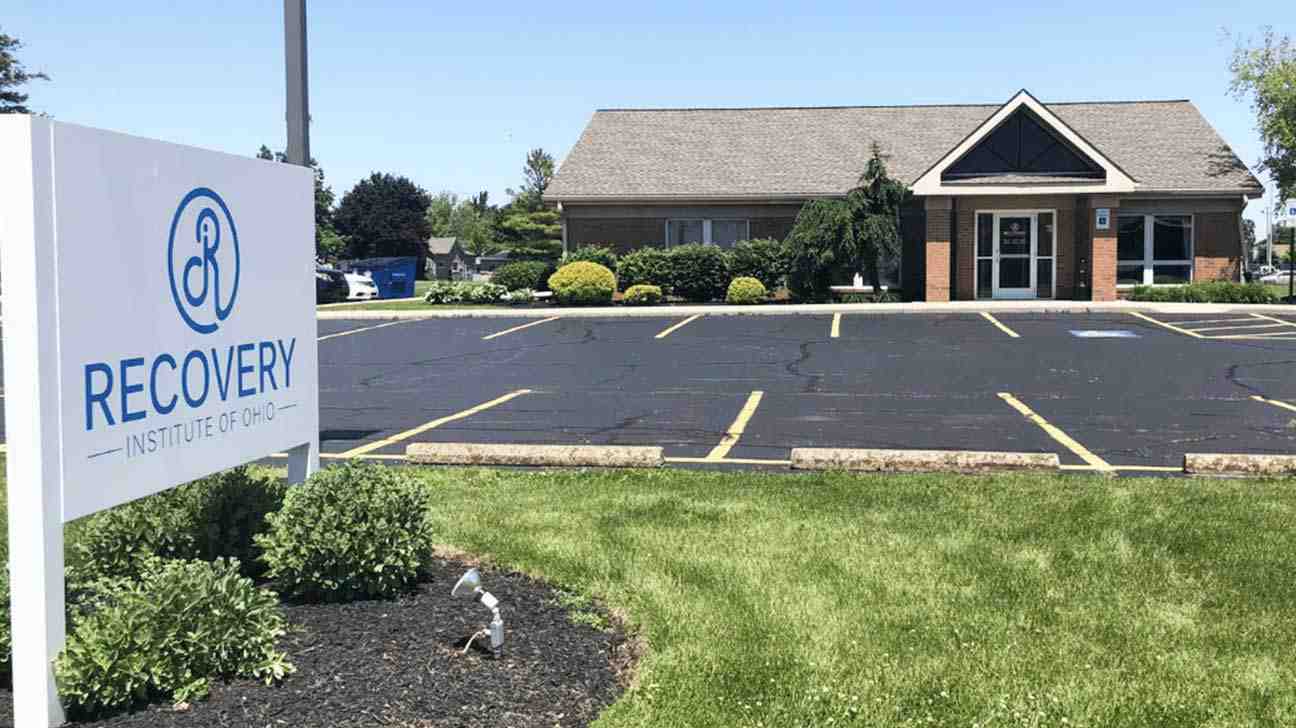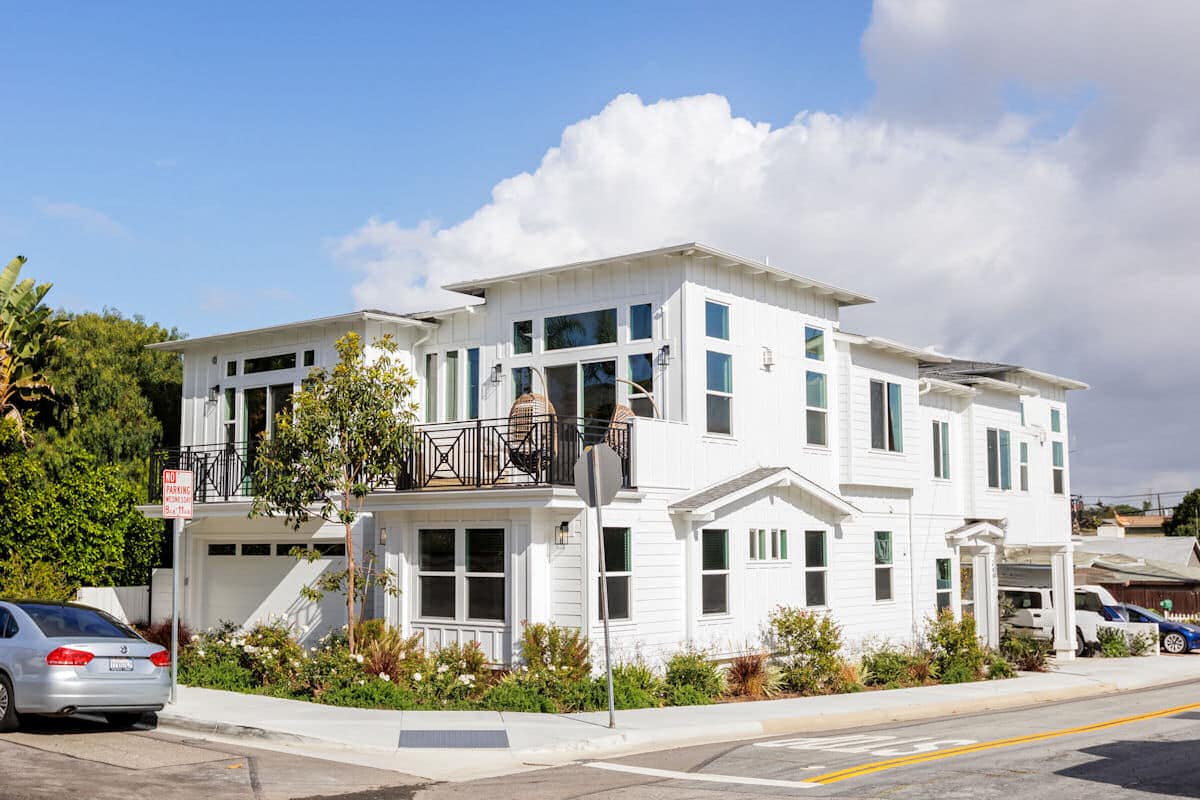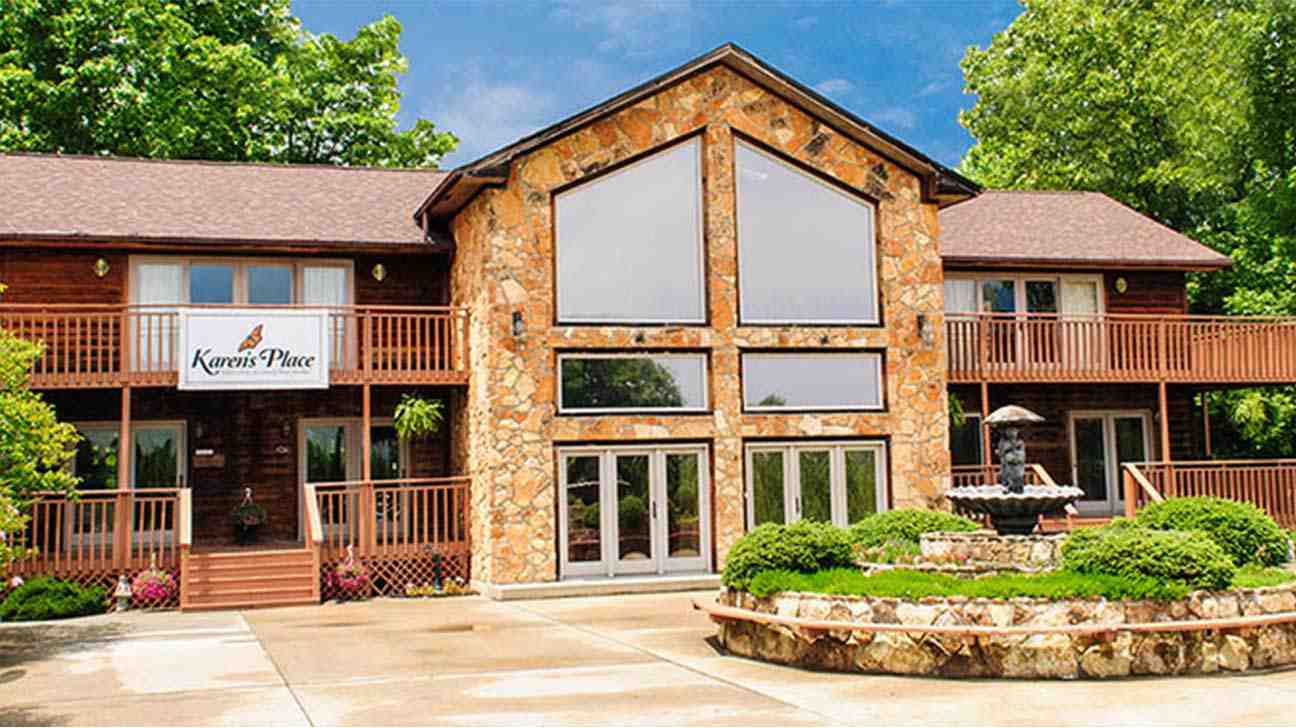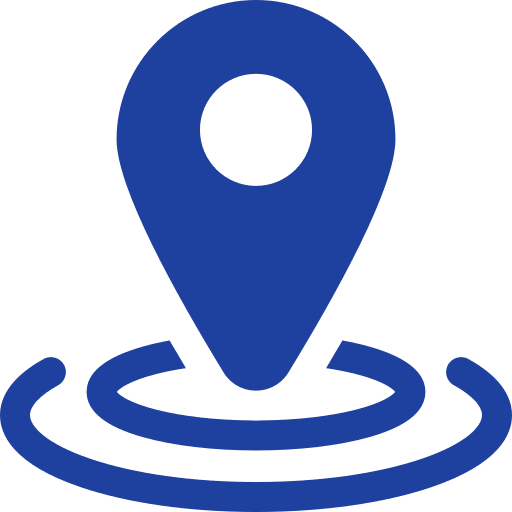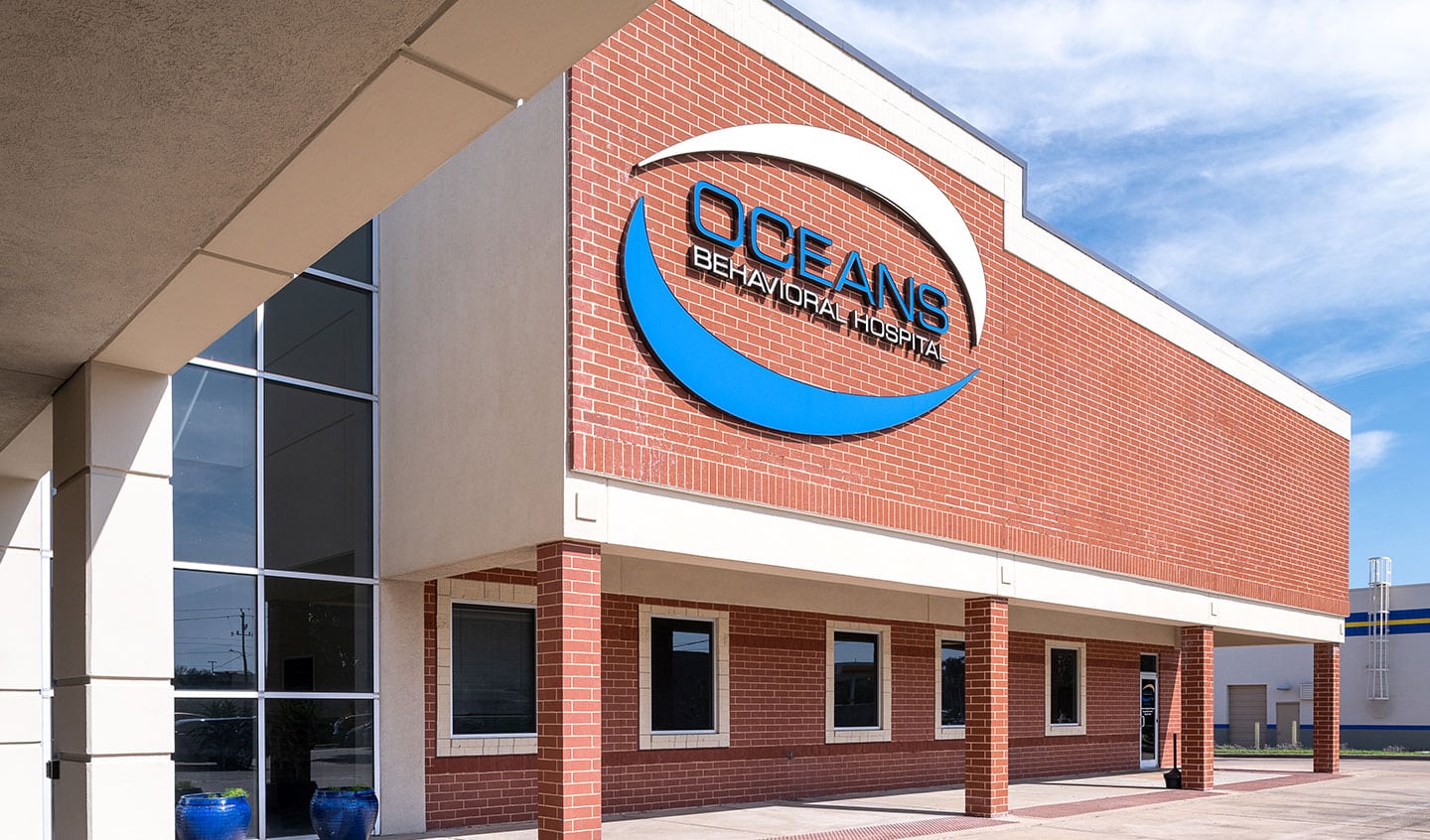
Understanding Mental Health Support in Pasadena
Mental health Pasadena residents can access through a variety of resources, from outpatient therapy and intensive programs to residential treatment and emergency crisis services. Whether you’re dealing with depression, anxiety, PTSD, substance use issues, or other mental health challenges, Pasadena offers multiple pathways to care.
Quick Answer: Mental Health Services in Pasadena
| Service Type | What It Offers | When to Use It |
|---|---|---|
| Outpatient Therapy | Weekly sessions, flexible scheduling | Managing ongoing mental health needs |
| Intensive Outpatient (IOP) | Multiple sessions per week, structured care | Need more support than weekly therapy |
| Partial Hospitalization (PHP) | Daily treatment, return home at night | Require intensive care but not 24/7 supervision |
| Residential Treatment | 24/7 support in structured environment | Severe symptoms needing constant care |
| Crisis Services | Immediate intervention | Emergency situations, call 988 or 911 |
One in five U.S. adults and one in six children experience mental illness each year. In Pasadena, these statistics translate to thousands of individuals and families seeking help. The good news? This guide connects you with real solutions, from understanding different treatment levels to accessing emergency support when every minute counts.
Depression affects more than 300 million people worldwide and is the leading cause of disability. But treatment works. The key is knowing where to start and what options exist in your community.
At Addiction Helpline America, we’ve spent years helping individuals and families steer mental health and addiction challenges, including connecting people with appropriate mental health Pasadena resources and treatment options. Our team understands the local landscape and can provide personalized guidance to help you or your loved one access the right level of care.
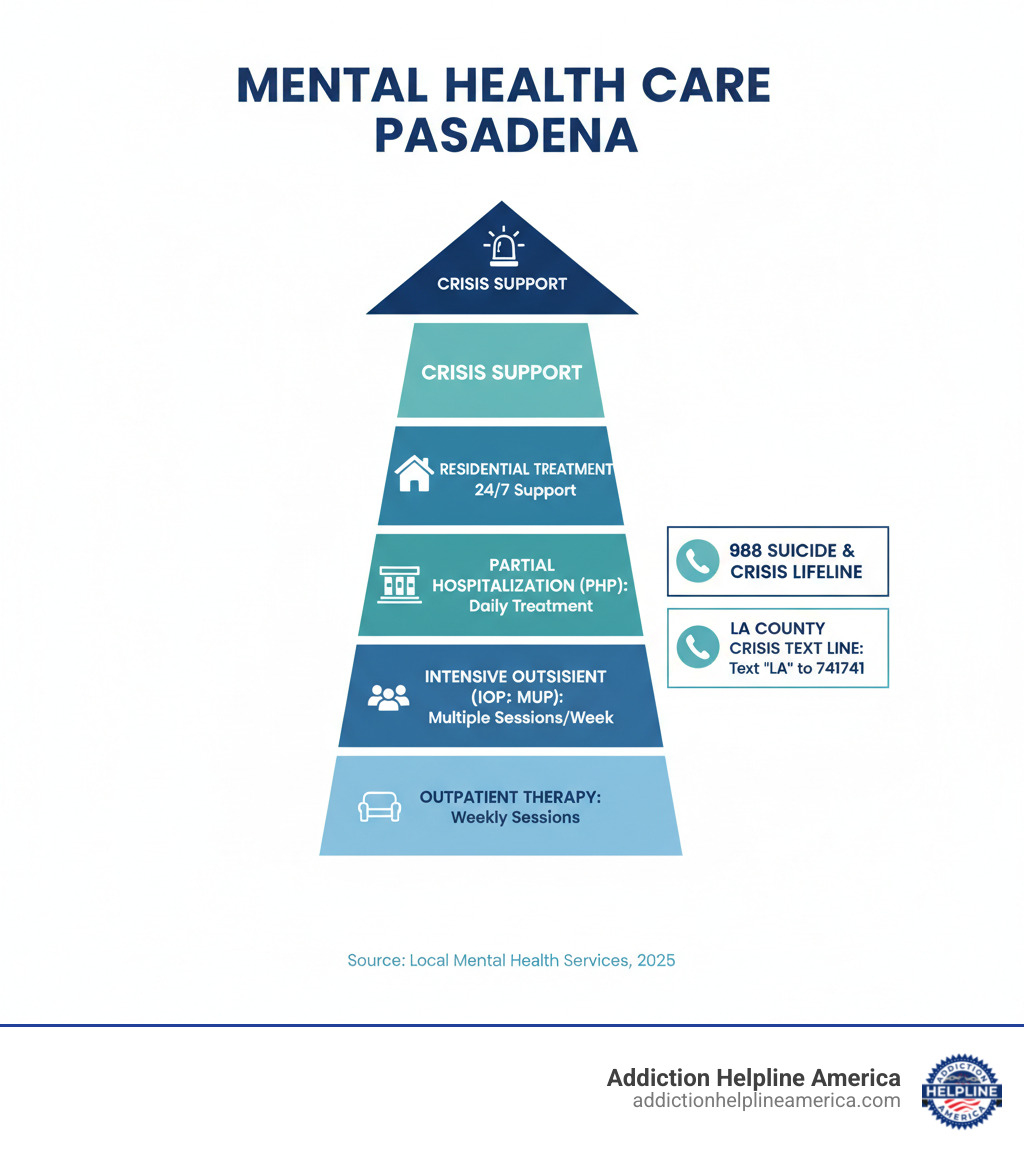
Glossary for Mental health Pasadena:
Understanding the Landscape of Mental Health Services in Pasadena

The Pasadena community has built a strong foundation of mental health Pasadena services designed to support mental wellness and provide comprehensive care. Whether you’re a student, a working professional, or a family member seeking help for a loved one, understanding what’s available is the first step toward healing.
We know that finding the right support can feel overwhelming. That’s why Addiction Helpline America is here to help you steer your options and connect you with the resources that best fit your unique situation. Prioritizing your Mental Wellness Support isn’t just about addressing symptoms—it’s about building a healthier, more fulfilling life.
Common Conditions Treated
Mental health providers in Pasadena address a wide range of conditions. Understanding these can help you recognize when to seek support.
- Depression: A leading cause of disability worldwide, according to the World Health Organization. Treatment is available for all types, and our Rehabs for Depression Guide can help you understand your options.
- Anxiety Disorders: Includes generalized anxiety, panic disorder, and social anxiety, which can be managed with evidence-based treatments.
- Bipolar Disorder: Specialized care is essential for managing mood swings, especially when co-occurring with substance use. We offer resources for Bipolar and Addiction.
- PTSD and Trauma: Specialized therapies help individuals process difficult experiences and move forward.
- Other Conditions: Care is also available for schizophrenia, co-occurring substance use disorders, personality disorders, OCD, and grief and loss.
Therapeutic Approaches and Treatment Methods
Providers in Pasadena use a variety of evidence-based approaches, often creating Customized Treatment Plans to fit your unique needs.
Cognitive Behavioral Therapy (CBT) is widely used to identify and change unhelpful thought patterns. For more intense emotional challenges, Dialectical Behavior Therapy (DBT) teaches skills in mindfulness, distress tolerance, and emotion regulation. For trauma, Eye Movement Desensitization and Reprocessing (EMDR) helps process distressing memories to reduce their emotional impact.
Family therapy involves loved ones to improve communication and build a stronger support system. Group therapy offers peer support, while individual therapy provides a confidential space for focused work. Other effective methods include mindfulness-based therapies (like meditation and yoga), Acceptance and Commitment Therapy (ACT), and experiential therapies.
The variety of approaches ensures that you can find a method that resonates with you. Finding the right fit is part of the journey, and Addiction Helpline America can help you steer these options to find what works best for your situation.
Levels of Care: From Outpatient to Residential Treatment

Finding the right level of care is about matching the support to your current needs. Mental health Pasadena services exist on a spectrum, from flexible outpatient therapy to immersive residential programs. This continuum of care allows you to move between levels as your needs change. Understanding the difference between Inpatient vs Outpatient Rehab can help you make an informed decision.
Outpatient and Intensive Outpatient Programs (IOP)
Outpatient programs offer structured support while allowing you to maintain your daily life, work, and family commitments.
- Partial Hospitalization Programs (PHP): This is the most intensive outpatient option, often called “day treatment.” It involves several hours of therapy and activities on most weekdays, but you return home at night. PHP is ideal for those needing significant support without 24/7 supervision.
- Intensive Outpatient Programs (IOP): A step down from PHP, IOPs typically involve sessions three to five days a week for a few hours each day. The focus is on building coping skills while you continue to manage daily responsibilities.
- Virtual IOPs: Many programs now offer virtual sessions, providing the same quality care with the added flexibility of attending from home. This removes barriers like transportation and childcare.
These programs help you apply therapeutic skills in real-time. Our guide on Outpatient Depression Treatment Centers Near Me can provide more information.
Inpatient and Residential Treatment
For those who need to step away from daily triggers and focus entirely on healing, inpatient and residential treatment provide a safe, structured environment with 24/7 support.
- Inpatient Psychiatric Stabilization: This is short-term, crisis-oriented care for when symptoms are severe or dangerous. The focus is on immediate safety and medical stabilization.
- Residential Treatment: These programs offer a longer-term, immersive experience (often 30 days or more). You live at the facility, participating in daily therapy and learning life skills in a supportive community. For those with co-occurring disorders, chemical dependency rehabilitation is often integrated.
This level of care provides the space to process trauma and build new, healthy patterns. Exploring Inpatient Rehabs Near Me can show you available options. After treatment, resources on How to Choose Sober Living can support long-term success.
At Addiction Helpline America, we help people steer these choices every day. We’re here to help you figure out what makes sense for your unique situation.
Key Public and Community Mental Health Resources in Pasadena

When you’re looking for mental health Pasadena support, knowing where to turn can feel overwhelming. The good news? Our city has dedicated public resources and community support systems designed to help residents access the care they need. These organizations serve as vital touchpoints for information and referrals. And when you need more specialized treatment options, we at Addiction Helpline America can help connect you with comprehensive care facilities.
Pasadena Public Health Department: A Community Hub
The Pasadena Public Health Department’s Social & Mental Health Division is a central resource for the community, located at 1845 N. Fair Oaks Ave., 2nd Floor. You can reach them at (626) 744-6339. This division provides essential social and mental health services, including counseling support and connections to specialized programs for diverse groups, including teens, older adults, and the LGBTQI2-S community.
While the department doesn’t provide inpatient care directly, they excel at connecting you to the right resources. They maintain a Pasadena Mental Health Resource Guide and can point you in the right direction for your specific needs. For more information, visit the Social and Mental Health Services Division website.
Community Support and Referral Resources
Beyond the Public Health Department, other community-oriented resources can help you get started.
- Pasadena City College Students: If you’re a student, you have access to dedicated Mental Health & Wellness Services by calling (626) 585-7273. They offer crisis support, including an after-hours line (press 9) to connect with a clinician.
- Your Primary Care Physician: Your doctor can be an excellent starting point. They can provide initial assessments and refer you to mental health specialists in the area.
- Addiction Helpline America: Our team provides free, confidential, and personalized guidance. We understand the local landscape and can help you steer treatment options, connecting you with the right program from our extensive network.
How to Access Care and Find Emergency Support in Pasadena
Finding help for mental health Pasadena residents need shouldn’t feel like solving a puzzle when you’re already struggling. Taking that first step is often the hardest part. This section covers how to access services and what to do in a crisis.
Navigating Insurance and Payment Options for Mental Health Pasadena
Worrying about how to pay for care shouldn’t stop you from getting help. Most health insurance plans cover mental health services. It’s best to call your insurance company to understand your specific benefits, including co-pays and deductibles. Many providers in Pasadena accept major plans like BlueCross BlueShield, Aetna, and Cigna. We can help you Verify Insurance so you know what to expect.
If you don’t have insurance, private pay options are available. Some providers offer sliding scale fees based on income or financial assistance programs. Don’t let cost be the reason you don’t reach out. Exploring resources like Free Addiction Treatment can also lead to options for co-occurring mental health conditions.
What to Do in a Mental Health Crisis
Knowing what to do in a crisis can save a life. If you are in a crisis now, help is just a phone call away.
- Immediate Danger: If someone is in immediate danger of harming themselves or others, call 9-1-1 right away. Tell the operator you need an officer trained in crisis intervention (CIT).
- Urgent Support (Call or Text): For urgent mental health concerns, substance use issues, or emotional distress, call or text the 988 Suicide & Crisis Lifeline. This free, confidential service is available 24/7. You can also chat online at 988lifeline.org.
- Urgent Support (Text): The LA County Crisis Text Line connects you with a trained crisis counselor. Text LA to 741741 for 24/7 support.
- County-Wide Access: The LACDMH ACCESS Program is the main entry point for LA County emergency mental health services. Call (800) 854-7771 anytime for assessments, referrals, and crisis intervention.
- PCC Students: Pasadena City College students can call 626-585-7273 and press 9 for an after-hours crisis line.
Reaching out during a crisis is an act of courage. These resources exist to help you through the hardest moments. For more information, visit our Mental Health Hotline page.
At Addiction Helpline America, we understand that navigating the system can feel overwhelming. We offer free, confidential guidance to help you find the right path forward.
Frequently Asked Questions about Mental Health in Pasadena
You’ve read about the different services available, the levels of care, and the public resources in Pasadena. Now let’s address some specific questions you might have as you consider your next steps.
How do I start the process of finding a therapist in Pasadena?
Taking the first step is the most important. Here are a few straightforward ways to begin:
- Talk to your primary care provider. They can offer initial guidance and referrals to mental health specialists.
- Contact your insurance company. They can provide a list of in-network therapists to help reduce costs.
- Use online search tools. Searching for therapists in Pasadena can help you find providers and learn about their specialties.
- Reach out to local clinics. Many have intake staff who can help match you with a therapist or program.
Most providers offer an initial consultation to see if it’s a good fit. At Addiction Helpline America, we offer free, confidential guidance to help you connect with mental health Pasadena resources that match your needs.
Are virtual or telehealth therapy options available in Pasadena?
Yes, absolutely. Virtual therapy has become a convenient and popular option. Many Pasadena providers offer remote sessions, allowing you to connect with a therapist from home. This includes Virtual Intensive Outpatient Programs (Virtual IOPs), which deliver structured, high-quality care online. Telehealth removes barriers like transportation and busy schedules, making it easier than ever to access support.
Can I take time off work for mental health treatment?
Yes. The Family and Medical Leave Act (FMLA) is a federal law that provides eligible employees with up to 12 weeks of job-protected, unpaid leave per year for serious health conditions, which includes mental health. This means you can take time for intensive therapy or a treatment program without losing your job.
To qualify, you generally must have worked for your employer for at least 12 months and for a company of a certain size. Speaking with your HR department is the best first step to understand your eligibility and the application process. You can also review the official FMLA information from the Department of Labor. Your mental health is just as important as your physical health, and the law recognizes this.
Conclusion: Your Path to Wellness Starts Here
We’ve covered a lot of ground together in this guide to mental health Pasadena resources, from understanding the different therapeutic approaches available to knowing exactly who to call in a crisis. It can feel overwhelming when you’re first starting out, but remember: every person who’s found healing took that same uncertain first step you’re considering right now.
Pasadena truly offers a comprehensive network of support. Whether you need the flexibility of outpatient therapy while maintaining your job, the structure of an intensive program, or the 24/7 care of residential treatment, options exist for every level of need. The public resources through the Pasadena Public Health Department provide essential community support and referrals, while crisis services like 988 and the LA County Crisis Text Line are always available when you need immediate help.
Hope and recovery aren’t just possible—they’re happening every day in our community. We’ve seen countless individuals and families move from crisis to stability, from isolation to connection, from merely surviving to truly thriving. Your story can be one of them.
At Addiction Helpline America, we understand that finding the right support isn’t just about location or insurance coverage. It’s about finding a place where you feel heard, where your specific needs are understood, and where the treatment approach resonates with you. That’s why we offer free, confidential, personalized guidance to help you steer the options and connect with the treatment center that’s the right fit for your unique situation.
You don’t have to figure this out alone. Our team has spent years building relationships with quality treatment providers and understanding the local landscape of care. We’re here to answer your questions, verify your insurance, and walk alongside you as you take this courageous step toward wellness.
Your path to healing starts with a single conversation. Let us help you find your way.
Our helpline is 100%
free & confidential
If you or someone you care about is struggling with drug or alcohol addiction, we can help you explore your recovery options. Don’t face this challenge alone—seek support from us.
Programs
Resources
Will my insurance
cover addiction
treatment?
We're ready to help
Find the best
drug or alcohol treatment
center
Are you or a loved one struggling with addiction? Call today to speak to a treatment expert.

